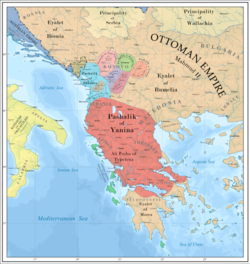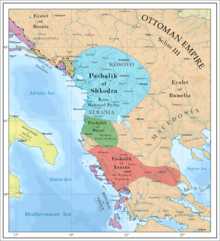Albanian Pashaliks
| History ofAlbania |
|---|
 |
| Timeline |

TheAlbanian Pashaliks(Albanian:Pashallëqet shqiptare) were three semi-independentpashaliksruled by Albanian pashas from 1760 to 1831 and covering the territory of modernAlbania,Kosovo,most ofMontenegro,southernSerbia,westernNorth Macedoniaand most of mainlandGreece.[1][2][3]The degree of independence of these pashaliks varied over time, from semi-autonomoustode factoindependent.
List of Albanian Pashaliks
[edit]| Nr | Pashalik | Main ruler | Years |
|---|---|---|---|
| 1 | Pashalik of Scutari | Kara Mahmud Bushati | 1757–1831 |
| 2 | Pashalik of Janina | Ali Pasha | 1787–1822 |
| 3 | Pashalik of Berat | Ahmet Kurt Pasha | 1774–1809 |
Pashalik of Scutari
[edit]

The Pashalik of Scutari or Pashalik of Shkodra (1757–1831) was a semi-autonomous and at timesde factoindependent entity within theOttoman Empire,created by Albanian leaders of NorthernOttoman Albania,covering today'sNorthern Albania,most ofMontenegro,southernSerbia,most ofKosovo,and northwesternNorth Macedonia.The Pashalik also expanded intoCentral Albania,southwestern North Macedonia, and northernWest Macedonia. The weakening of Ottoman central authority and thetimar systembrought anarchy to the Albanian-populated lands. In the late 18th century, two Albanian centers of power emerged: Shkodër, under the Bushati family; andJanina,underAli Pasha of Tepelenë.When it suited their goals, both places cooperated with theSublime Porte,and when it was expedient to defy the central government, each acted independently.[4] In 1757, Mehmed Bey Bushati proclaimed himself Pasha of Shkodër, eying at a degree of autonomy/independence Mehmed Ali Pasha had established for himself in Egypt. His son and successor Kara Mahmoud pursued a policy of military expansion; he established his control over northern Albania (up to the Shkumbi River) and over Kosovo. He launched two attacks on Montenegro (1785, 1796) and defeated resp. outlasted several Ottoman expeditions dispatched to subdue him. Kara Mahmoud's autonomous pashalik did receive the attention of the Austrian and Russian foreign office, both regarding him a potential ally against the Sublime Porte. In 1796, Kara Mahmoud was killed when he suffered defeat at the hands of the Montenegrins. He was succeeded by his brother Ibrahim Pasha, a less warlike personality loyal to the Ottoman Empire (-1810). The Bushati Dynasti continued to hold on to the Pashalik until an Ottoman army under Mehmet Reshid Pasha besieged Rozafat Castle at Shkodër in 1831 and forced Mustafa Bushati to surrender (1831). The pashalik was dissolved, the Vilayets of Shkodër and of Kosovo established. An uprising in Shkodër in 1833-1836 failed in reestablishing the autonomy enjoyed under the Bushati. The latter established the Bushati Library in the 1840es, which played an important role in the cultural awakening of northern Albania.
Pashalik of Janina
[edit]
The Pashalik of Yanina or Pashalik of Janina (1787–1822) was ade factoindependent entity under theOttoman Empire,created byAli Pasha,anAlbanianleader of SouthernOttoman Albania,encompassing most of mainlandGreece,Southern and CentralAlbania,and southwestNorth Macedonia. In 1787 Ali Pasha was awarded thepashalukofTrikalain reward for his support for the sultan's war againstAustria.This was not enough to satisfy his ambitions; shortly afterwards, he seized control of Ioánnina, which remained his power base for the next 33 years. Like other regional leaders that emerged in that time, such asOsman Pazvantoğlu,he took advantage of a weak Ottoman government to expand his territory still further until he gainedde factocontrol of most of Albania, western Greece and thePeloponnese,either directly or through his sons. Ali's policy as ruler of Ioánnina was governed by little more than simple expediency; he operated as an effectively independent despot and allied himself with whoever offered the most advantage at the time. In order to gain a seaport on the Albanian coast Ali formed an alliance withNapoleon I of Francewho had establishedFrancois Pouquevilleas his general consul in Ioánnina. After theTreaty of Tilsittwhere Napoleon granted the Czar his plan to dismantle the Ottoman Empire, Ali switched sides and allied with theUnited Kingdom of Great Britain and Irelandin 1807. His machinations were permitted by the Ottoman government inIstanbulfor a mixture of expediency - it was deemed better to have Ali as a semi-ally than as an enemy - and weakness, as the central government did not have enough strength to oust him at that time. The poetGeorge Gordon Byron, 6th Baron Byronvisited Ali's court in Ioánnina in 1809 and recorded the encounter in his workChilde Harold.He evidently had mixed feelings about the despot, noting the splendour of Ali's court and the Greek cultural revival that he had encouraged in Ioánnina, which Byron described as being "superior in wealth, refinement and learning" to any other Greek town. In a letter to his mother, however, Byron deplored Ali's cruelty: "His Highness is a remorseless tyrant, guilty of the most horrible cruelties, very brave, so good a general that they call him the Mahometan Buonaparte... but as barbarous as he is successful, roasting rebels, etc, etc.."
In 1820, Ali ordered the assassination of a political opponent inConstantinople.The reformist SultanMahmud II,who sought to restore the authority of theSublime Porte,took this opportunity to move against Ali by ordering his deposition. Ali refused to resign his official posts and put up a formidable resistance to Ottoman troop movements, indirectly helping the Greek Independence as some 20,000 Turkish troops were fighting Ali's formidable army. In January 1822, however, Ottoman agents assassinated Ali Pasha and sent his head to the Sultan. After his death the pashalik ceased to exist.
Pashalik of Berat
[edit]ThePashalik of Beratwas a pashalik created in modern-day centralAlbaniabyAhmet Kurt Pashain 1774 and dissolved after Ahmet's ally,Ibrahim Pasha of Beratwas defeated by Ali Pasha in 1809, thus incorporating the pashalik, with thePashalik of Janina.This pashalik was one of the three pashaliks created byAlbaniansin the period of Albanian Pashaliks. The Pashalik of Berat was created afterAhmet Kurt Pashamanaged to complot with theSublime PorteagainstMehmed Pasha Bushatiin 1774. For his service, thesultangave him territories in centralAlbania.He managed to grow hispashalikuntil his death in 1787, incorporating territories of all central Albania, bordering to the north with thePashalik of Scutariand to the south with thePashalik of Janina. Ahmet Kurt Pashawas the grandfather of Ali Pasha, and father of Ali's mother, Hanka. After the death ofAhmet Kurt Pasha,the territory of the pashalik was ruled by a close ally of him,Ibrahim Pasha of Berat. As this territory belonged to the Middle Albania,Ibrahim Pashawas roused at this encroachment. This made Ali Pasha start a war with the Pashalik of Berat. After some fruitless negotiation,Ibrahim Pashasent a body of troops under the command of his brother Sephir, bey of Avlona. Against these, Ali summoned the armatoles of Thessaly; and after villages had been burnt, peasants robbed and hanged, and flocks carried off on both sides, peace was made. Ibrahim gave his daughter in marriage to Mookhtar, the eldest son of Ali, and the disputed territory as her dower. As Sephir bey had displayed qualities which might prove formidable hereafter, Ali contrived to have him poisoned by a physician; and, after his usual fashion, he hanged the agent of the crime, that no witness might remain of it.[5]Ali Pasha has said that he should prevail over the pasha of Berat, become vizir of Epirus, fight with the Sultan, and go to Constantinople.[6]In 1808, Ali Pasha defeatedIbrahim Pasha,incorporating its territory in thePashalik of Janina.
See also
[edit]References
[edit]- ^"Albania - Medieval culture".Encyclopædia Britannica.3 July 2023.
- ^Gegaj, Athanas; Young, Antonia; Ma, John Hodgson; Krasniqi, Rexhep; Hodgson, John; Young, Nigel; Bland, William B.; Young, Cooley Research Professor in Peace Studies and Director of the Peace Studies Program Nigel (13 April 1997).Albania.Clio Press.ISBN9781851092604.
- ^Доклады российских ученых: IX Конгресс по изучению стран Юго-Восточной Европы, Тирана, 30.08-03.09.2004.Наука. 13 April 2004.ISBN9785020270077.
- ^Zickel, Raymond; Iwaskiw, Walter R. (1994).""Local Albanian Leaders in the Early 19th century," Albania: A Country Study ".countrystudies.us.Retrieved9 April2008.
- ^History of the War of Independence in Greece (1830) Author: Keightley, Thomas, 1789-1872 Volume: 1 Publisher: Edinburgh, Constable
- ^Christianity And Islam Under The Sultans Vol II (1929) Author: Hasluck, F.W. Subject: RELIGION. THEOLOGY; Prehistoric and primitive religions Publisher: Oxford at the Clarendon Press.
Sources
[edit]"History of Albanian People" Albanian Academy of Science.ISBN99927-1-623-1
